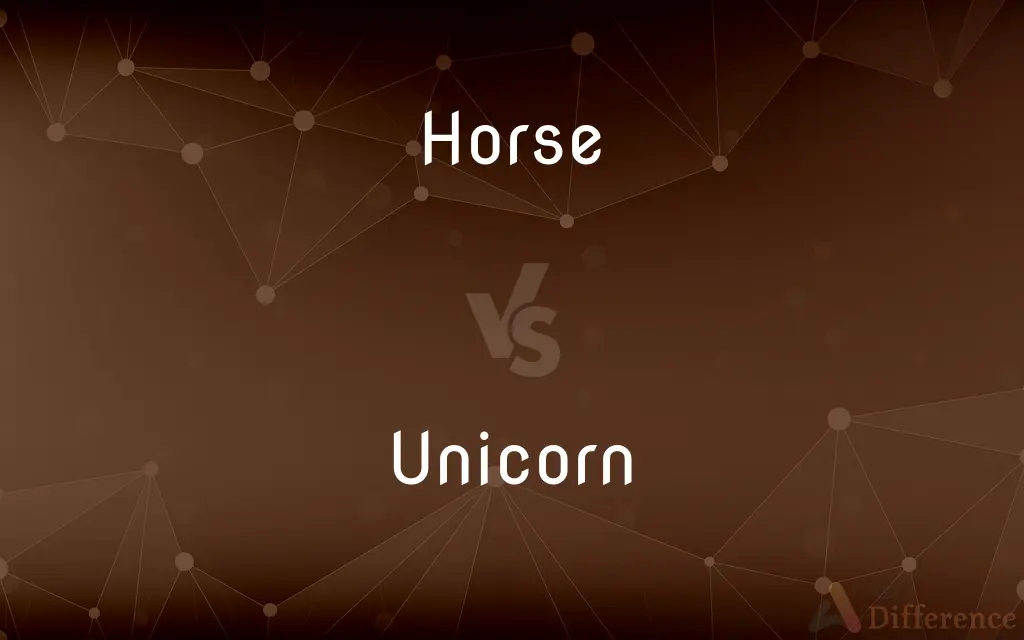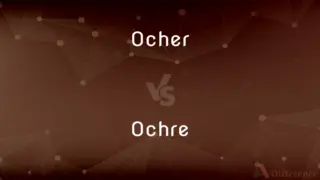Horse vs. Unicorn — What's the Difference?
Edited by Tayyaba Rehman — By Maham Liaqat — Updated on March 14, 2024
A real, widely-domesticated mammal known for its speed and strength. While a mythical creature symbolizing purity and grace, often depicted with a single horn.

Difference Between Horse and Unicorn
Table of Contents
ADVERTISEMENT
Key Differences
Horses are real, large mammals domesticated for riding, racing, and work, known for their speed and versatility in various human activities. Unicorns, on the other hand, are mythical creatures from folklore, often symbolizing purity, grace, and magical powers, primarily recognized by their single, spiraling horn.
While horses have a significant role in human history, used in warfare, agriculture, and sports, unicorns have been a part of mythology and symbolism, representing everything from innocence to high spirituality. Horses are tangible and have been bred for specific traits, whereas unicorns, being fictional, are depicted with idealized features that vary across different cultures.
Horses come in a variety of breeds, each with distinct characteristics and purposes, such as racing, jumping, or working. Unicorns, however, are usually described with a consistent set of traits, including a horse-like body, a spiraled horn, and magical abilities, showing less variation than the breeds of horses.
In terms of cultural impact, horses have a profound and practical presence in many societies, reflected in sports, agriculture, and historical combat. The unicorn's impact is more symbolic, often representing unattainable ideals, purity, and the enchantment of the natural world.
Despite the horse's tangible presence and utility in the real world, the unicorn's appeal lies in its mystery and the endless possibilities of the imagination. Both animals hold a place in human culture, but on different planes of reality and symbolism.
ADVERTISEMENT
Comparison Chart
Existence
Real animal
Mythical creature
Symbolism
Power, freedom, nobility
Purity, grace, magic
Physical Characteristics
Varies by breed; generally solid-hoofed, maned
Horse-like body with a single, spiraling horn
Role in Society
Work, transport, sport, companionship
Symbolic, representing ideals and fantasy
Cultural Representation
Widely represented in history, sports, and agriculture
Found in mythology, art, and popular culture
Compare with Definitions
Horse
An essential part of human history, used in warfare, agriculture, and as a mode of transport.
Knights rode horses into battle.
Unicorn
Often depicted in art and literature, embodying magical qualities.
The unicorn in the painting sparkled with an ethereal light.
Horse
A symbol of freedom and power in many cultures.
The wild horse symbolizes untamed spirit.
Unicorn
A symbol of innocence, beauty, and rarity in various cultures.
The unicorn is often seen as a creature of pure goodness.
Horse
Equus ferus caballus, coming in various breeds with different abilities.
The Arabian horse is renowned for its endurance.
Unicorn
Represents the unattainable or the perfection in popular culture and symbolism.
For her, the unicorn represented all that was unachievable in life.
Horse
Used in sports and competitions, like horse racing and show jumping.
She trained her horse for the upcoming equestrian competition.
Unicorn
A mythical creature resembling a horse with a single horn on its forehead, symbolizing purity and grace.
Tales of the unicorn have fascinated people for centuries.
Horse
A large domesticated mammal known for its speed and strength, used for riding, racing, and work.
The horse galloped across the field effortlessly.
Unicorn
Associated with magical powers and healing abilities in folklore.
Legends say the unicorn's horn can purify water.
Horse
The horse (Equus ferus caballus) is a domesticated one-toed hoofed mammal. It belongs to the taxonomic family Equidae and is one of two extant subspecies of Equus ferus.
Unicorn
The unicorn is a legendary creature that has been described since antiquity as a beast with a single large, pointed, spiraling horn projecting from its forehead. The unicorn was mentioned by the ancient Greeks in accounts of natural history by various writers, including Ctesias, Strabo, Pliny the Younger, Aelian and Cosmas Indicopleustes.
Horse
A large plant-eating domesticated mammal with solid hoofs and a flowing mane and tail, used for riding, racing, and to carry and pull loads.
Unicorn
A fabled creature symbolic of virginity and usually represented as a horse with a single straight spiral horn projecting from its forehead.
Horse
A frame or structure on which something is mounted or supported, especially a sawhorse.
Unicorn
(Heraldry) A representation of this beast, having a horse's body, a stag's legs, a lion's tail, and a straight spiral horn growing from its forehead, especially employed as a supporter for the Royal Arms of Great Britain or of Scotland.
Horse
A unit of horsepower
A 63-horse engine
Unicorn
Unicorn The constellation Monoceros.
Horse
Heroin.
Unicorn
Something that is greatly desired but difficult or impossible to find
“Is antigravity the unicorn of physics? Or do we simply lack the strategy and bait to catch it in an experimental snare?” (Jerome Groopman).
Horse
An obstruction in a vein.
Unicorn
(Business) A startup company valued at one billion dollars or more.
Horse
Provide (a person or vehicle) with a horse or horses
Six men, horsed, masked, and armed
Unicorn
A mythical beast resembling a horse or deer with a single, straight, spiraled horn projecting from its forehead.
Horse
A large hoofed mammal (Equus caballus) having a short coat, a long mane, and a long tail, domesticated since ancient times and used for riding and for drawing or carrying loads.
Unicorn
(historical) In various Bible translations, used to render the Latin rhinoceros (representing Hebrew ):}} a reem or wild ox.
Horse
Any of various equine mammals, such as the wild Asian species Przewalski's horse or certain extinct forms related ancestrally to the modern horse.
Unicorn
Any large beetle having a horn-like prominence on the head or prothorax, especially the Hercules beetle, Dynastes tityus.
Horse
A frame or device, usually with four legs, used for supporting or holding.
Unicorn
A caterpillar, Schizura unicornis, with a large thorn-like spine on the back near its head.
Horse
(Sports) A vaulting horse.
Unicorn
The kamichi, or unicorn bird.
Horse
(Slang) Heroin.
Unicorn
(military) A howitzer.
Horse
Often horses Horsepower
A muscle car with 400 horses under the hood.
Unicorn
(business) A person with multidisciplinary expertise, especially three or more skills in a young field such as UX design or data science (e.g., domain knowledge, statistics, and software engineering).
Purple squirrel
Horse
Mounted soldiers; cavalry
A squadron of horse.
Unicorn
(finance) A startup company whose valuation has exceeded one billion U.S. dollars, which is solely backed by venture capitalists, and which has yet to have an IPO.
Horse
A block of rock interrupting a vein and containing no minerals.
Unicorn
(attributive) Being many (especially pastel) colours; multicoloured.
Unicorn smoothies
Horse
A large block of displaced rock that is caught along a fault.
Unicorn
(historical) A 15th-century Scottish gold coin worth 18 shillings, bearing the image of a unicorn.
Horse
To provide with a horse.
Unicorn
(finance) To exceed a valuation of one billion U.S. dollars, while solely backed by venture capitalists.
Horse
To haul or hoist energetically
"Things had changed little since the days of the pyramids, with building materials being horsed into place by muscle power" (Henry Allen).
Unicorn
Having one horn.
Horse
To be in heat. Used of a mare.
Unicorn
A fabulous animal with one horn; the monoceros; - often represented in heraldry as a supporter.
Horse
Of or relating to a horse
A horse blanket.
Unicorn
A two-horned animal of some unknown kind, so called in the Authorized Version of the Scriptures.
Canst thou bind the unicorn with his band in the furrow?
Horse
Mounted on horses
Horse guards.
Unicorn
Any large beetle having a hornlike prominence on the head or prothorax.
Horse
Drawn or operated by a horse.
Unicorn
The kamichi; - called also unicorn bird.
Horse
Larger or cruder than others in the same category
Horse pills.
Unicorn
A howitzer.
Horse
A hoofed mammal, Equus ferus caballus, often used throughout history for riding and draft work.
A cowboy's greatest friend is his horse.
Unicorn
An imaginary creature represented as a white horse with a long horn growing from its forehead
Horse
Any member of the species Equus ferus, including the Przewalski's horse and the extinct Equus ferus ferus.
Horse
(zoology) Any current or extinct animal of the family Equidae, including zebras and asses.
These bone features, distinctive in the zebra, are actually present in all horses.
Horse
Cavalry soldiers (sometimes capitalized when referring to an official category).
We should place two units of horse and one of foot on this side of the field.
All the King's horses and all the King's men, couldn't put Humpty together again.
Horse
A component of certain games.
Horse
(slang) A large and sturdy person.
Every linebacker they have is a real horse.
Horse
(historical) A timber frame shaped like a horse, which soldiers were made to ride for punishment.
Horse
Equipment with legs.
Horse
In gymnastics, a piece of equipment with a body on two or four legs, approximately four feet high, sometimes (pommel horse) with two handles on top.
She's scored very highly with the parallel bars; let's see how she does with the horse.
Horse
A frame with legs, used to support something.
A clothes horse; a sawhorse
Horse
(nautical) Type of equipment.
Horse
A rope stretching along a yard, upon which men stand when reefing or furling the sails; footrope.
Horse
An iron bar for a sheet traveller to slide upon.
Horse
A jackstay.
Horse
(mining) A mass of earthy matter, or rock of the same character as the wall rock, occurring in the course of a vein, as of coal or ore; hence, to take horse (said of a vein) is to divide into branches for a distance.
Horse
(US) An informal variant of basketball in which players match shots made by their opponent(s), each miss adding a letter to the word "horse", with 5 misses spelling the whole word and eliminating a player, until only the winner is left. Also HORSE, H-O-R-S-E or H.O.R.S.E. (see H-O-R-S-E).
Horse
(uncountable) The flesh of a horse as an item of cuisine.
Horse
(prison slang) A prison guard who smuggles contraband in or out for prisoners.
Horse
A translation or other illegitimate aid in study or examination.
Horse
Horseplay; tomfoolery.
Horse
(slang) Heroin drug.
Horse
(intransitive) To frolic, to act mischievously. (Usually followed by "around".)
Horse
(transitive) To play mischievous pranks on.
Horse
(transitive) To provide with a horse; supply horses for.
Horse
(obsolete) To get on horseback.
Horse
To sit astride of; to bestride.
Horse
(of a male horse) To copulate with (a mare).
Horse
To take or carry on the back.
Horse
To place (someone) on the back of another person, or on a wooden horse, chair, etc., to be flogged or punished.
Horse
(by extension) To flog.
Horse
(transitive) To pull, haul, or move (something) with great effort, like a horse would.
Horse
(informal) To cram (food) quickly, indiscriminately or in great volume.
Horse
To urge at work tyrannically.
Horse
To charge for work before it is finished.
Horse
A hoofed quadruped of the genus Equus; especially, the domestic horse (Equus caballus), which was domesticated in Egypt and Asia at a very early period. It has six broad molars, on each side of each jaw, with six incisors, and two canine teeth, both above and below. The mares usually have the canine teeth rudimentary or wanting. The horse differs from the true asses, in having a long, flowing mane, and the tail bushy to the base. Unlike the asses it has callosities, or chestnuts, on all its legs. The horse excels in strength, speed, docility, courage, and nobleness of character, and is used for drawing, carrying, bearing a rider, and like purposes.
Horse
The male of the genus Equus, in distinction from the female or male; usually, a castrated male.
Horse
Mounted soldiery; cavalry; - used without the plural termination; as, a regiment of horse; - distinguished from foot.
The armies were appointed, consisting of twenty-five thousand horse and foot.
Horse
A frame with legs, used to support something; as, a clotheshorse, a sawhorse, etc.
Horse
A frame of timber, shaped like a horse, on which soldiers were made to ride for punishment.
Horse
Anything, actual or figurative, on which one rides as on a horse; a hobby.
Horse
A mass of earthy matter, or rock of the same character as the wall rock, occurring in the course of a vein, as of coal or ore; hence, to take horse - said of a vein - is to divide into branches for a distance.
Horse
A translation or other illegitimate aid in study or examination; - called also trot, pony, Dobbin.
Horse
Heroin.
Horse
Horsepower.
Horse
To provide with a horse, or with horses; to mount on, or as on, a horse.
Horse
To sit astride of; to bestride.
Horse
To mate with (a mare); - said of the male.
Horse
To take or carry on the back; as, the keeper, horsing a deer.
Horse
To place on the back of another, or on a wooden horse, etc., to be flogged; to subject to such punishment.
Horse
To get on horseback.
Horse
Solid-hoofed herbivorous quadruped domesticated since prehistoric times
Horse
A padded gymnastic apparatus on legs
Horse
Troops trained to fight on horseback;
500 horse led the attack
Horse
A framework for holding wood that is being sawed
Horse
A chessman in the shape of a horse's head; can move two squares horizontally and one vertically (or vice versa)
Horse
Provide with a horse or horses
Common Curiosities
What do unicorns symbolize?
Unicorns symbolize purity, grace, magic, and are often seen as symbols of innocence and the unattainable.
What is a horse?
A horse is a large, domesticated mammal known for its speed and strength, used for riding, racing, and work.
Are unicorns real?
No, unicorns are mythical creatures and do not exist in reality, unlike horses which are real animals.
How are horses and unicorns different?
Horses are real, tangible animals with practical uses in society, whereas unicorns are mythical creatures with symbolic meanings.
Can unicorns be of any color?
In mythology and popular culture, unicorns can be depicted in various colors, though they are often portrayed as white, symbolizing purity.
Do horses have magical powers?
No, horses do not possess magical powers; they are valued for their physical abilities and roles in human society.
What is the significance of the unicorn's horn?
The unicorn's horn is often said to have magical properties, such as the ability to purify water and heal sicknesses.
What do horses symbolize?
Horses symbolize power, freedom, nobility, and are often associated with significant cultural and historical roles.
What is a unicorn?
A unicorn is a mythical creature resembling a horse but distinguished by a single, spiraling horn on its forehead, often associated with purity and magical powers.
Do unicorns appear in all cultures?
While not all cultures have myths involving unicorns, many do feature similar mythical creatures that embody purity and magic.
Why do people believe in unicorns?
People may believe in unicorns or enjoy their stories due to their symbolic meanings, representing purity, magic, and the wonder of the imagination.
Are there unicorn horses?
While no real horses have a single horn, some representations, art, or costumes might depict a horse as a unicorn for symbolic or decorative purposes.
How are horses used by humans?
Horses are used for a variety of purposes, including transportation, work, sports, and as companions.
Is the unicorn a national symbol?
In some cultures, the unicorn can be a symbolic or national emblem, representing ideals of purity and strength.
How many breeds of horses are there?
There are over 300 breeds of horses, each adapted for various uses, including work, sport, and companionship.
Share Your Discovery

Previous Comparison
Paprika vs. Pimento
Next Comparison
Ocher vs. OchreAuthor Spotlight
Written by
Maham LiaqatEdited by
Tayyaba RehmanTayyaba Rehman is a distinguished writer, currently serving as a primary contributor to askdifference.com. As a researcher in semantics and etymology, Tayyaba's passion for the complexity of languages and their distinctions has found a perfect home on the platform. Tayyaba delves into the intricacies of language, distinguishing between commonly confused words and phrases, thereby providing clarity for readers worldwide.















































